The SSD Anthology: Understanding SSDs and New Drives from OCZ
by Anand Lal Shimpi on March 18, 2009 12:00 AM EST- Posted in
- Storage
PCMark Vantage
Next up is PCMark Vantage, another system-wide performance suite. For those of you who aren’t familiar with PCMark Vantage, it ends up being the most real-world-like hard drive test I can come up with. It runs things like application launches, file searches, web browsing, contacts searching, video playback, photo editing and other completely mundane but real-world tasks. I’ve described the benchmark in great detail before but if you’d like to read up on what it does in particular, take a look at Futuremark’s whitepaper on the benchmark; it’s not perfect, but it’s good enough to be a member of a comprehensive storage benchmark suite. Any performance impacts here would most likely be reflected in the real world.
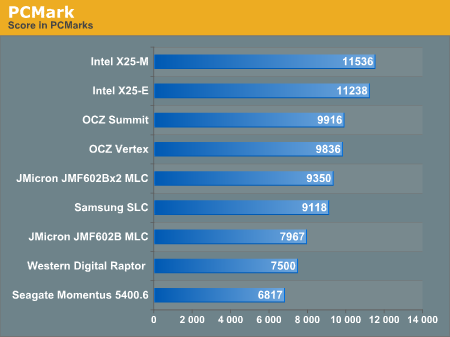
If you've paid attention to the synthetic tests from the previous pages, the results here should make sense. The Intel drives take the top two spots followed by the two OCZ drives, then the JMicron and conventional HDDs take up the rear.
While PCMark does do a great job of measuring disk performance, it doesn't seem to stress random write performance as much, allowing the JMicron drives to relax a bit.
Now let's look at the individual test suites:
The memories suite includes a test involving importing pictures into Windows Photo Gallery and editing them, a fairly benign task that easily falls into the category of being very influenced by disk performance.
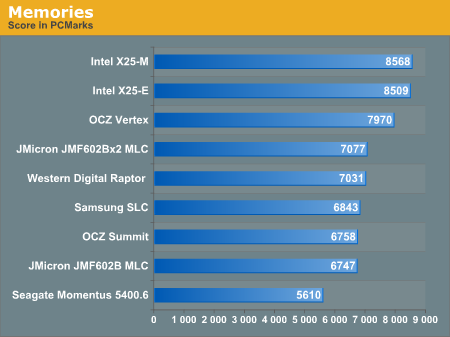
The TV and Movies tests focus on on video transcoding which is mostly CPU bound, but one of the tests involves Windows Media Center which tends to be disk bound.
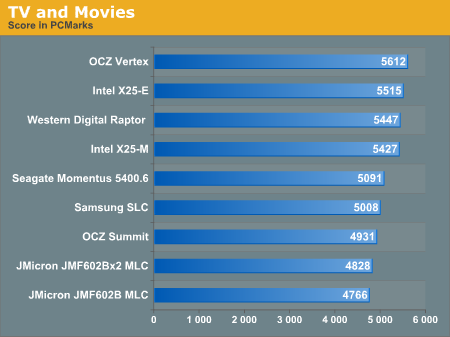
SSDs won't always dominate and in many cases they won't offer tangible improvements over a fast hard drive.
The gaming tests are very well suited to SSDs since they spend a good portion of their time focusing on reading textures and loading level data. All of the SSDs dominate here, but as you'll see later on in my gaming tests the benefits of an SSD really vary depending on the game. Take these results as a best case scenario of what can happen, not the norm.
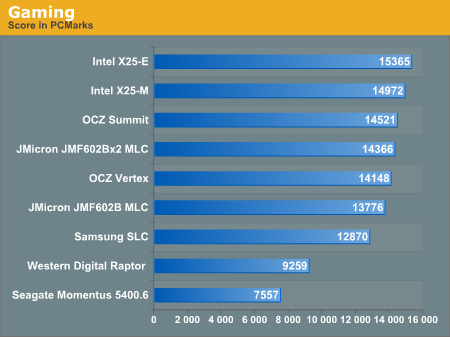
In the Music suite the main test is a multitasking scenario: the test simulates surfing the web in IE7, transcoding an audio file and adding music to Windows Media Player (the most disk intensive portion of the test).
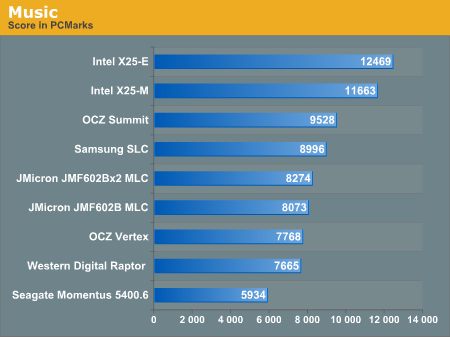
The Communications suite is made up of two tests, both involving light multitasking. The first test simulates data encryption/decryption while running message rules in Windows Mail. The second test simulates web surfing (including opening/closing tabs) in IE7, data decryption and running Windows Defender.

I love PCMark's Productivity test; in this test there are four tasks going on at once, searching through Windows contacts, searching through Windows Mail, browsing multiple webpages in IE7 and loading applications. This is as real world of a scenario as you get and it happens to be representative of one of the most frustrating HDD usage models - trying to do multiple things at once. There's nothing more annoying than trying to launch a simple application while you're doing other things in the background and have the load take seemingly forever.
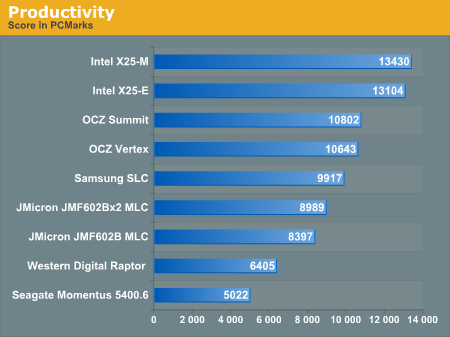
The results here are the best characterization of my personal experience with the drives. The Intel drives are the fastest, a good 25% faster than the Summit or Vertex. Next up are the OCZ drives, with the Vertex dangerously close to the Summit. The older Samsung SLC is next in the standings, followed by the JMicron drives. There's a healthy combination of reads and writes going on here which benefits all of the SSDs, including the less desirable ones.
The final PCMark Vantage suite is HDD specific and this is where you'll see the biggest differences between the drives:
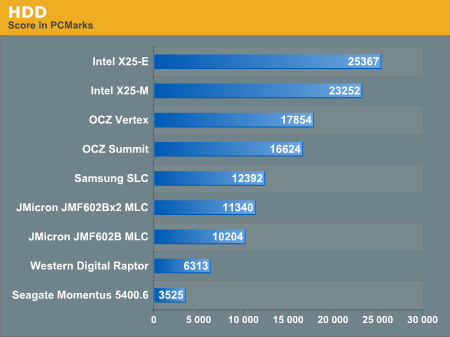
Again we're seeing the sort of breakdown we'd expect. The Intel drives come out ahead, while the Vertex is the best bang for your buck.










250 Comments
View All Comments
sbuckler - Wednesday, March 18, 2009 - link
Depends on how smart the controller is? Shuffling around the data now and again in the background would make sense.Frallan - Wednesday, March 18, 2009 - link
@AT
This is why i come to AT to read up on the developments.
@OCZ
Well played :0)
The ruler of the roost are the Intels however I will be able to afford one of those when there are cows enjoying themselfs by dancing on the moon. My next upgrade will be a Vertex - not only bc its Valu for money but equally much bc. OCZ obviously takes care of thier customers and listens to reason.
pmonti80 - Wednesday, March 18, 2009 - link
This is the kind of article that makes me come back here.nowayout99 - Wednesday, March 18, 2009 - link
OCZ, you should listen to Uncle Anand. ;) Hopefully Mr. Petersen understands that it's tough love.And the final product seems perfectly cool -- great performance at a better price than Intel. It's the first SSD I'd be able to reasonably consider.
SOLIDNecro - Wednesday, March 18, 2009 - link
Thx for this article Anand, I have been in a hotly contested debate over OCZ vs Samsung with my "Asperger Enhanced" nemisis/close friend...(In all fairness, I should mention I use the BiPolar SSE instruction set myself)
He was only looking at Samsung, I said he should look into what OCZ has now.
His reply was "I don't know them, and don't want to be disapointed"
(Long story behind that...He's from the Server/Workstain/HPC crowd, I am from the hardcore OC/Gamer/Desktop group, so he is not familiar with OCZ)
Looks like the Samsung (And alot of others) has "Issues" with performance degrading over time that are somewhat solved by Intel and OCZ (Plus maybe a few other companies that use the Rev B JMicron controller on there low cost SSD's)
I agree the OCZ Vertex offers the best bang for low buck SSD today, and I am tempted to grab one. But a year from now, anyone that bought a current gen MLC SSD will be saying "I coulda had a V-8" if that TRIM technology does what it promises!!!
James5mith - Wednesday, March 18, 2009 - link
As people continue to try and push the envelope of storage performance in a variety of ways, and as 6gbps SATA becomes available, the performance of SSD's will only go up.As always, I wanted to say thanks for the great article and keep them coming. It's the only way the rest of us can keep pace with what's happening out there in the world of performance storage.
vailr - Wednesday, March 18, 2009 - link
Is there any benefit in using 2 SSD's in a Raid 0 configuration?And: any differences between motherboard Intel Raid vs. a Raid controller card from Areca, for example. Also: can the "Trim" command work while in Raid mode? Probably not, I'm guessing...
7Enigma - Thursday, March 19, 2009 - link
Raid0 is really the holy grail for SSD's. The low risk of failure of SSD's which normally makes Raid0 with typical mechanical HD's more dangerous is very appealing. My personal storage-size goal is ~120-160gigs. Once they reach that size for under $300 I think I'm going to jump in. But I'm more likely to grab 2 60's or 2 80's and Raid0 them than get a single large SSD. The added performance will outweigh the higher power draw of 2 drives, and should make them extremely competitive with Intel's offerings (or whatever holds the crown at the time).I figure it will be about a year or so until the prices are in that range, as 2 60gig Vertex drives will currently run you about $400 after rebate.
I can't wait to jump on that upgrade and will then put my current 250gig mechanical drive as the storage drive (I don't use a ton of space in general as I have a 320gig external backup).
Rasterman - Thursday, March 19, 2009 - link
The problem with doing that is if you want to move your drives to another system they won't work, so upgrading is a pain. You could image them I guess, but plugging one drive in is much simpler. I had an older XP install that made it through 3-4 different systems.I would also question real world results, if you're going at 250MB/s or 500MB/s its not even going to be noticeable unless you are doing some massive video editing or some other huge file operations, and as Anand says, SSDs don't fill this role right now as they are super expensive per GB. So if you really are editing video a lot, you are going to need a hell of a lot more space than SSDs can offer you.
Gasaraki88 - Friday, March 20, 2009 - link
RAID is a universal standard so if you take two RAID0 drives out and move them to another computer with a RAID controller, it SHOULD just work if the original RAID was doing it correctly.